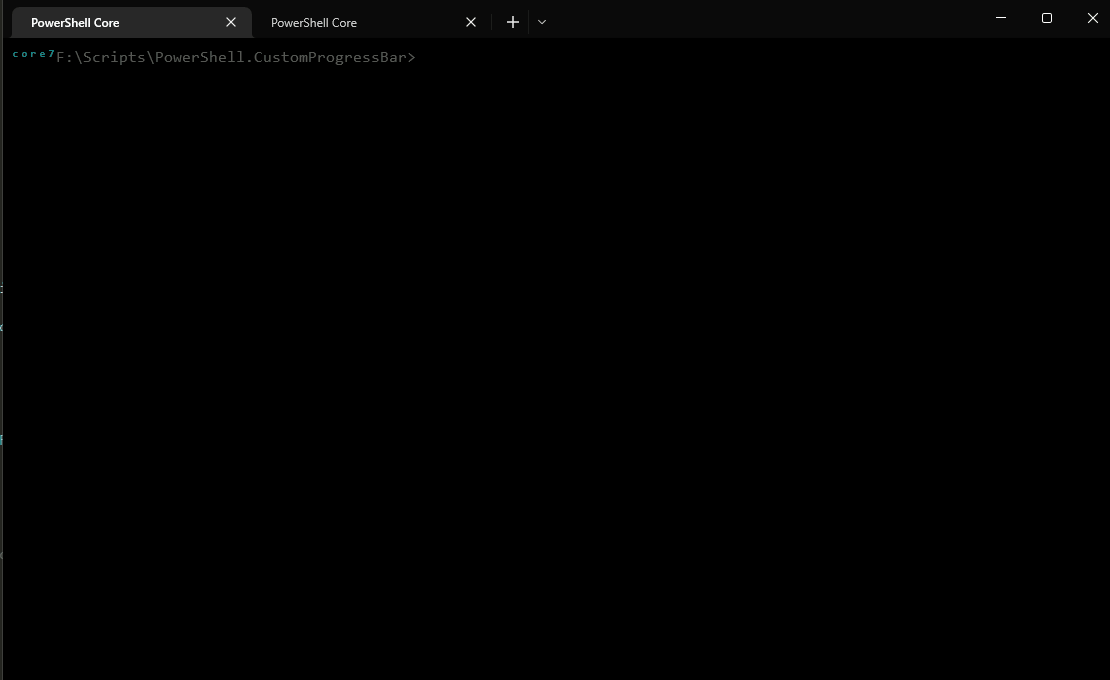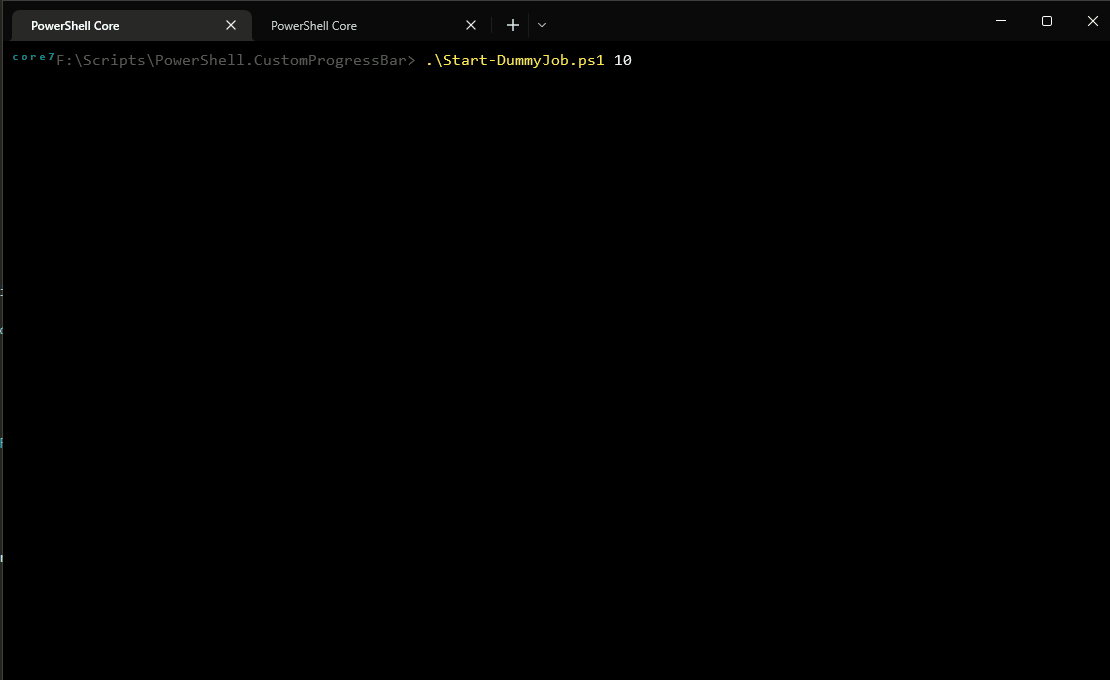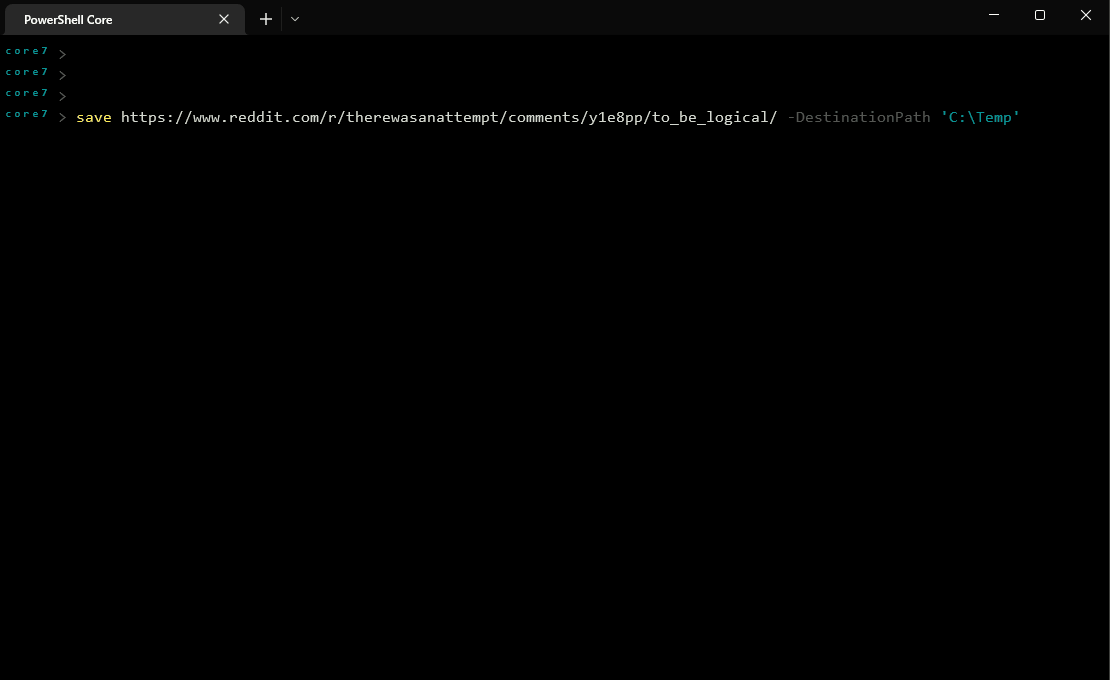
Day after day, night after night, writing PowerShell scripts. It is inevitable, you will become a p0w325h311 31173 c0d32. Your scripts will become more complex and will take more time to complete. Logs only go so far, while you wait for the completion of your scripts, you’ll need a progress / activity indicator.
This can be achievable by using Write-Progress cmdlet which Displays a progress bar within a Powershell command window. Unfortunately that function comes with it’s own disadvantages. In this article, we implement our own progress bar for our scripts.
Rationale
Before going any further, let me just explain why the progress bar provided in PowerShell isn’t perfectly suited for us.
Write-Progress
This cmdlet provided in PowerShell may be included as a few lines of code, wrapped as a function to be used repeatedly throughout a script, or mixed in with variables to minimize code duplication.
Pros Ease of use. Lots of information provided to the user.
Cons The huge screen real-estate reserved for the progress bar when in use: nearly 1/8th of the screen. Moreover, the display may hide some important script outputs and you can’t do anything about it. <p>Performance: </p> even though the implementation is purely native; each call to Write-Progress will do some processing, rendering so the user must be extra carefull with how he uses Write-Progress * <p>I will come back on this subject later with a more detailed explanation and comparison with a custom implentation.</p>
The advantages of rolling our own </h3>
Pros Aesthetics: i’m a sucker for ascii-based menus and progress bars. Those are more pretty. Moreover we can make it so the size and position of our progress bar is customizable, smaller than the natively provided cmdlet, it is only a single line of text, at the current cursor position, and does not hide any output or status messages from other commands.
Performance:
using a RefreshDelay and a GUI update delay improves the performance by having the progress logic to only be processed every time the GUI is updated, and we control when the GUI is updated.
The Basics </h3>
- New-AsciiProgressBar - Used to initialize the ProgressBar variables attached to progressbar. Counters and Threading related variables.
- Write-AsciiProgressBar - Used to send progress events to the ProgressBar.
- Close-AsciiProgressBar - Used to deinitialize the ProgressBar cleanly.
Implementation Details </h3>
Our ascii-based progress bar requires a way to output to console at specified position and color: Write-ConsoleExtended
Requirements Write-ConsoleExtended
function Write-ConsoleExtended{
<#
.SYNOPSIS
Write a string in the console
.DESCRIPTION
Write a string in the console at specific position and color
.PARAMETER Message
Message to be printed
.PARAMETER PosX
Cursor X position where message is to be printed
.PARAMETER PosY
Cursor Y position where message is to be printed
.PARAMETER ForegroundColor
Foreground color for the message
.PARAMETER BackgroundColor
Background color for the message
.PARAMETER Clear
Clear whatever is typed on this line currently
.PARAMETER NoNewline
After printing the message, return the cursor back to its initial position
.EXAMPLE
Write-ConsoleExtended "MY TITLE" -x ([System.Console]::get_BufferWidth()/2) -f Red
Write a string in the center of screen in red
.NOTES
Author: Guillaume Plante
Last Updated: October 2022
#>
[CmdletBinding(SupportsShouldProcess)]
param(
[Parameter(Mandatory = $True, Position = 0, HelpMessage="Message to be printed")]
[Alias('m')]
[string]$Message,
[Parameter(Mandatory = $False, HelpMessage="Cursor X position where message is to be printed")]
[Alias('x')]
[int] $PosX = -1,
[Parameter(Mandatory = $False, HelpMessage="Cursor Y position where message is to be printed")]
[Alias('y')]
[int] $PosY = -1,
[Parameter(Mandatory = $False, HelpMessage="Foreground color for the message")]
[Alias('f')]
[System.ConsoleColor] $ForegroundColor = [System.Console]::ForegroundColor,
[Parameter(Mandatory = $False, HelpMessage="Background color for the message")]
[Alias('b')]
[System.ConsoleColor] $BackgroundColor = [System.Console]::BackgroundColor,
[Parameter(Mandatory = $False, HelpMessage="Clear whatever is typed on this line currently")]
[Alias('c')]
[switch] $Clear,
[Parameter(Mandatory = $False, HelpMessage="After printing the message, return the cursor back to its initial position.")]
[Alias('n')]
[switch] $NoNewline
)
$fg_color = [System.Console]::ForegroundColor
$bg_color = [System.Console]::BackgroundColor
$cursor_top = [System.Console]::get_CursorTop()
$cursor_left = [System.Console]::get_CursorLeft()
$new_cursor_x = $cursor_left
if ($PosX -ge 0) { $new_cursor_x = $PosX }
$new_cursor_y = $cursor_top
if ($PosY -ge 0) { $new_cursor_y = $PosY }
if ( $Clear ) {
[int]$len = ([System.Console]::WindowWidth - 1)
# use the string constructor for init a string with character 32 (space), len times
[string]$empty = [string]::new([char]32,$len)
[System.Console]::SetCursorPosition(0, $new_cursor_y)
[System.Console]::Write($empty)
}
[System.Console]::ForegroundColor = $ForegroundColor
[System.Console]::BackgroundColor = $BackgroundColor
[System.Console]::SetCursorPosition($new_cursor_x, $new_cursor_y)
# Write the message, if NoNewline, go ack to beginning
[System.Console]::Write($Message)
if ( $NoNewline ) {
[System.Console]::SetCursorPosition($cursor_left, $cursor_top)
}
# back to previous colors
[System.Console]::ForegroundColor = $fg_color
[System.Console]::BackgroundColor = $bg_color
}
Start-AsciiProgressBar
function Start-AsciiProgressBar{
<#
.SYNOPSIS
Initialize the Ascii Progress Bar
.DESCRIPTION
Initialize the Ascii Progress Bar by seting the size of the bar in characters. If you set the EstimatedSeconds
value, there will e a countdown timer in the progress bar.
.PARAMETER EstimatedSeconds
The estimated time of the job that will be refreshing the progress bar. If this is set there will be a countdown
timer in the progress message
.PARAMETER Size
The size of the progress bar in characters
.PARAMETER EmptyChar
The character used in the progress bar
.PARAMETER FullChar
The character used in the progress bar
.EXAMPLE
Initialize-AsciiProgressBar 30
Initialize the progress bar with default settings, no countdown timer sizr of 30 character
.EXAMPLE
Initialize-AsciiProgressBar 30 30
Initialize the progress bar so that it will diaplay a countdown timer for 30 seconds
.NOTES
Author: Guillaume Plante
Last Updated: October 2022
#>
[CmdletBinding()]
Param(
[Parameter(Mandatory = $false,Position=0, HelpMessage="The estimated time the process will take")]
[int]$EstimatedSeconds=0,
[Parameter(Mandatory = $False,Position=1, HelpMessage="The size of the progress bar")]
[int]$Size=30,
[Parameter(Mandatory = $False,Position=2, HelpMessage="Empty char in the ascii progress bar")]
[char]$EmptyChar = '-',
[Parameter(Mandatory = $False,Position=3, HelpMessage="Full char in the ascii progress bar")]
[char]$FullChar = 'O'
)
$Script:CurrentSpinnerIndex = 0
$Script:Max = $Size
$Script:Half = $Size/2
$Script:Index = 0
$Script:Pos=0
$Script:EstimatedSeconds = $EstimatedSeconds
$Script:EmptyChar = $EmptyChar
$Script:FullChar = $FullChar
$Script:progressSw.Start()
[Datetime]$Script:StartTime = [Datetime]::Now
$e = "$([char]27)"
#hide the cursor
Write-Host "$e[?25l" -NoNewline
}
Write-AsciiProgressBar
Now to build the meat. The central. The Write-AsciiProgressBar function.
function Write-AsciiProgressBar{
<#
.SYNOPSIS
Displays the completion status for a running task.
.DESCRIPTION
Show-AsciiProgressBar displays the progress of a long-running activity, task,
operation, etc. It is displayed as a progress bar, along with the
completed percentage of the task. It displays on a single line (where
the cursor is located). As opposed to Write-Progress, it doesn't hide
the upper block of text in the PowerShell console.
.PARAMETER Percentage
Completion percentage
.PARAMETER UpdateDelay
The 'refresh' interval for the update of the progress bar. This will **not** sleep.
If the function is called 100 times per seconds and the UpdateDelay is 100, the progress bar will be
refreshed once every 100 milliseconds, **not** 100*seconds
.PARAMETER ProgressDelay
Amount of time between two 'refreshes' of the percentage complete and update
of the progress bar. This is a sleep in the function. Default is 5 ms
.PARAMETER ForegroundColor
Foreground color for the message
.PARAMETER BackgroundColor
Background color for the message
.EXAMPLE
Show-AsciiProgressBar
Without any arguments, Show-AsciiProgressBar displays a progress bar refreshing at every 100 milliseconds.
If no value is provided for the Activity parameter, it will simply say
"Current Task" and the completion percentage.
.EXAMPLE
Show-AsciiProgressBar 50 5 "Yellow"
Displays a progress bar refreshing at every 50 milliseconds in Yellow color
.NOTES
Author: Guillaume Plante
Last Updated: October 2022
#>
[CmdletBinding()]
Param(
[Parameter(Mandatory = $True,Position=0, HelpMessage="Completion percentage.")]
[ValidateRange(0, 100)]
[int]$Percentage,
[Parameter(Mandatory = $false,Position=1, HelpMessage="Completion percentage.")]
[string]$Message="",
[Parameter(Mandatory = $false,Position=2, HelpMessage="The interval at which the progress will update.")]
[int]$UpdateDelay=100,
[Parameter(Mandatory = $False,Position=3, HelpMessage="The delay this function will sleep for, in ms. Used to replace the sleed in calling job")]
[int]$ProgressDelay=5,
[Parameter(Mandatory = $False,Position=4, HelpMessage="Foreground color for the message")]
[Alias('f')]
[System.ConsoleColor] $ForegroundColor = [System.Console]::ForegroundColor,
[Parameter(Mandatory = $False,Position=5, HelpMessage="Background color for the message")]
[Alias('b')]
[System.ConsoleColor] $BackgroundColor = [System.Console]::BackgroundColor
)
$ms = $Script:progressSw.Elapsed.TotalMilliseconds
if($ms -lt $UpdateDelay){
return
}
$spinners = @( "-","\","|","/")
$Script:CurrentSpinnerIndex++
if($Script:CurrentSpinnerIndex -ge $spinners.Count){
$Script:CurrentSpinnerIndex = 0
}
$CurrentSpinner = $spinners[$Script:CurrentSpinnerIndex]
$ElapsedSeconds = [Datetime]::Now - $Script:StartTime
$Script:progressSw.Restart()
$Script:Pos = [math]::Round(($Script:Max / 100) * $Percentage)
$str = ''
For($a = 0 ; $a -lt $Script:Pos ; $a++){
$str += "$Script:FullChar"
}
$str += $CurrentSpinner
For($a = $Script:Pos ; $a -lt $Script:Max ; $a++){
$str += "$Script:EmptyChar"
}
$ElapsedTimeStr = ''
$secsofar = $Script:EstimatedSeconds - $ElapsedSeconds.TotalSeconds
$ts = [timespan]::fromseconds($secsofar)
if($ts.Ticks -gt 0){
$ElapsedTimeStr = "{0:mm:ss}" -f ([datetime]$ts.Ticks)
}
$ProgressMessage = "Progress: [{0}] {1} {2}" -f $str, $ElapsedTimeStr, $Message
Write-ConsoleExtended "$ProgressMessage" -ForegroundColor "$ForegroundColor" -BackgroundColor "$BackgroundColor" -Clear -NoNewline
Start-Sleep -Milliseconds $ProgressDelay
}
Stop-AsciiProgressBar
The Stop-AsciiProgressBar function is going to be very similar.
How to Use </h3>
I have provided a simple code block with a dummy PowerShell Job making uses of the ascii progress bar.
Start-AsciiProgressBar
This function is called once, before the job is started. Initialize the progress bar with default settings, no countdown timer sizr of 30 character
Initialize the progress bar so that it will diaplay a constructortdown timer for 30 seconds
Write-ActivityIndicatorBar
Called at every iteration of the loop Shows an animation to represent activity in the job
Write-AsciiProgressBar
Write-AsciiProgressBar
Called at every iteration of the loop Without any arguments, Write-AsciiProgressBar displays a progress bar refreshing at every 100 milliseconds. If no value is provided for the Activity parameter, it will simply say “Current Task” and the completion percentage.
Write-AsciiProgressBar 50 5 "Yellow"
Displays a progress bar refreshing at every 50 milliseconds in Yellow color
Example </h3>
You can use Get-Help to view the help for the function or use the switch -Examples to see some usage examples from the function’s native help. Of course, the best way to test and understand Show-Progress is to put it to work. Let’s look at a few usage scenarios.
Use the provided dummy job code for example
Get-Help Write-AsciiProgressBar -Examples
Start a dummy job with ASCII progress bar
. .\Start-DummyJob.ps1 10
Activity Indicator

Progress Bar

Progress Bar Demo

Get the code
PowerShell.CustomProgressBar on GitHub
Important Note Do You have Issues accessing the core repository? Don’t be shy and send me an EMAIL at guillaumeplante.qc@gmail.com and I will fix access for you
